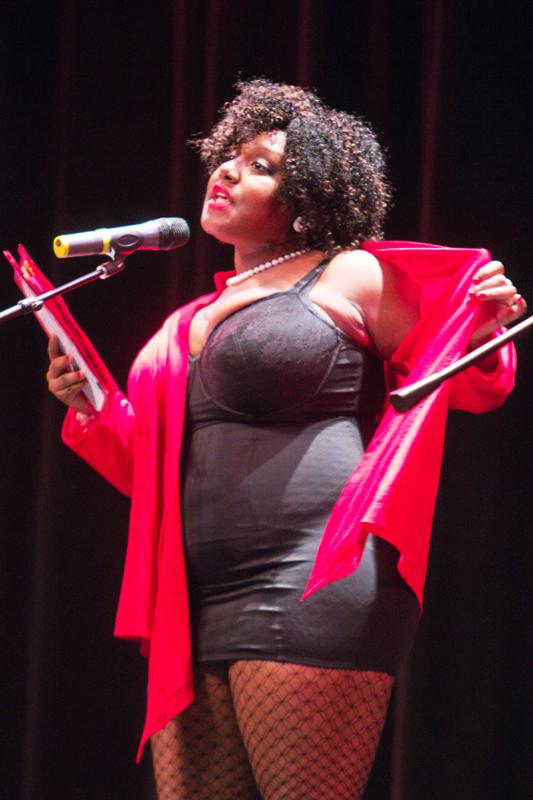It was heard echoing through Speakers Circle, shouted throughout the student center and, on Saturday, the word erupted from Jesse Hall — “vagina.”
The 11th annual MU Vagina Monologues were performed by a group of more than 100 women to a full house in Jesse Auditorium on Saturday.
“It’s one of the most exciting events we get to do,” LGBTQ Resource Center coordinator Struby Struble said. “I’m lucky that my full time job is centered around social justice and doing things that I believe in, but it’s not often that 1,700 people stand up and clap for what we are doing.”
The Vagina Monologues, originally written by Eve Ensler in 1996, are the main campaign to raise awareness for V-Day, a global movement to end violence toward women and girls.
“This is a serious matter and (we want) more people that we can get out there to help encourage others to speak up and speak out about stopping violence,” sophomore performer Pebble Smith said. “Encourage your friends to be open, don’t be afraid to speak your mind and tell somebody, reach out for help and just know that you’re not the only one, and there’s always someone out there going through the same thing or worse, so don’t feel like you’re the only one.”
The monologue performers used comedy and dramatics to address the hard topic of abuse that tends to be overlooked by society.
“Because there is this social stigma about the things that we talk about how women aren’t allowed to complain about tampons and masturbation and sex and all that stuff, being able to scream that in front of 1,700 people is probably the most invigorating vitalizing thing,” sophomore performer Jodie Sabino said. “It’s so amazing to know you’re speaking on behalf of other women who can’t speak for themselves.”
Smith and Sabino have both performed in the Vagina Monologues twice. Struble has participated in the Vagina Monologues at MU since 2002 and takes pride in its differences each year.
“The monologues are different every year because there are different women performing and there’s a different number of women performing each monologue,” Struble said. “Each group gets to put a new spin on what the monologue looks like to them and how they feel about it and it’s always exciting to see how people will change and reinvigorate their monologue.”
Counselors were available throughout the performance for anyone who needed to talk, though the majority of the audience seemed to become more empowered as the monologues went on.
“Hearing the heartfelt stories made me think about what I want to do to make things better for women,” freshman Melissa Nguyen said. “How I could help women not take anything from boys and violence is not just something we should talk about, but we should actually end it.”
Although the performance took on a comedic approach addressing common slang terms for vaginas such as “the breakfast of champions” and “The Maneater” here at MU, they also focused on eliminating negative words and actions toward women.
“The first part is being aware of it,” Sabino said. “(To stop) using words nonchalantly like ‘rape’ or other derogatory words about females, in every day conversation because it’s kind of the culture for it to be acceptable to say, ‘Oh, I raped that test,’ when it’s not OK. Those are trigger words that can mean a lot to a lot of different people and everyone being a survivor in their own different situation.”
Because this is an issue that can affect women of all ages and backgrounds, any woman who auditioned for the Vagina Monologues and was willing to put in the time and effort could perform.
“At first I was nervous,” Smith said. “But actually seeing that I’m part of a good cause and I’m actually able to do something to help people, it feels good because I’m contributing to something good. I’m not just doing it for my own benefit or for my own pleasure. I’m actually doing it to help someone else and help women speak out.”
Through the use of comedy, the Vagina Monologues portrayed the message that one has to laugh to keep from crying.
“(Violence) isn’t something that’s far away,” Struble said. “It’s here also and for the people who have experienced violence, it’s important to remember that even though this unimaginable event has occurred in someone’s life, they still have their full, whole happy and healthy life to live. Just because you’ve experienced violence doesn’t mean your entire life is over. Your entire life is affected and it changes, but you also still have health and happiness and the possibility of healing and moving forward, and the monologues show that as well.”
The monologues’ main goals are to empower women, and the performers tried to accomplish this using their energy and passion.
“I just wanted to tell my friends it’s OK to be proud that you’re a woman,” Sobino said. “It’s OK to talk about the things that we’re not allowed to talk about. It’s OK to be OK with sex, and so for me it’s just a movement to aware all of my friends and all of my friends’ friends that it’s ok to be a woman and I have no issue with that whatsoever.”
Proceeds from this performance went to the Leadership through Education and Advocacy for the Deaf Institute and True North Shelter, a safe space for survivors of domestic and sexual violence.








